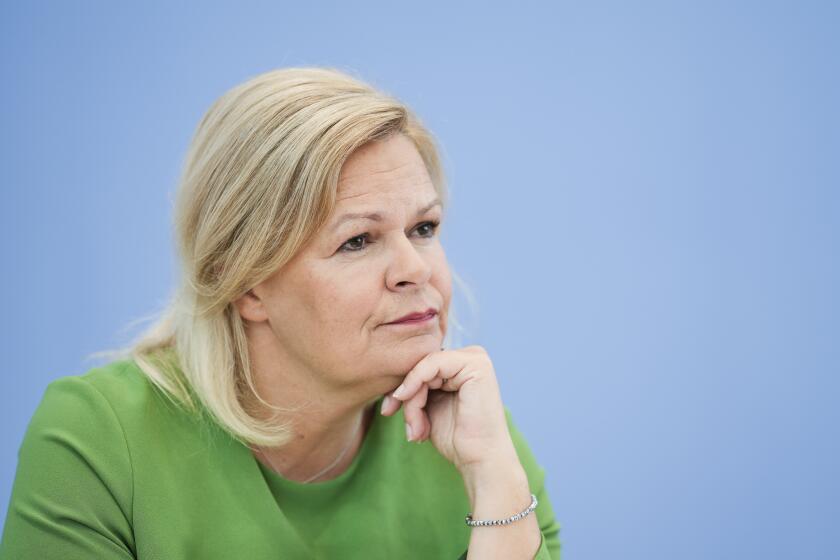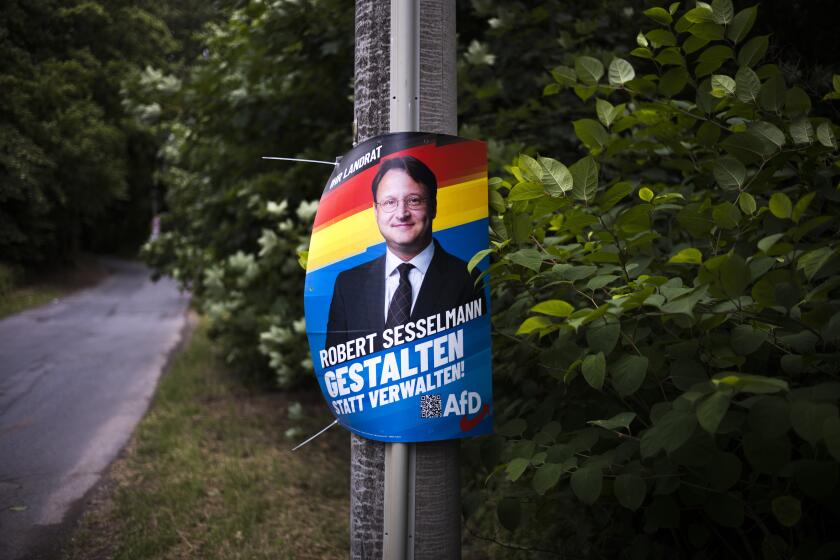Shelters for migrants fill up across Germany as attitudes toward them harden

- Share via
BERLIN — Dozens of people from around the world lined up on a sunny morning this week in front of a former mental health hospital in Berlin to apply for asylum in Germany.
There were two older women from Moldova. A young man from Somalia sat next to them on a bench. A group of five young Pakistanis chatted loudly, standing behind two pregnant women from Vietnam.
The newcomers are among more than 10,000 migrants who have applied for asylum in the German capital this year, and are coming at a time when Berlin is running out of space to accommodate them.
“The situation is not very good at the moment,” Sascha Langenbach, the spokesperson for the state office for refugee affairs in Berlin, said in an interview this week. “This is much more than we expected last year.”
The former mental health hospital in Berlin’s Reinickendorf neighborhood was turned into the city’s registration center for asylum seekers in 2019 and can house up to 1,000 migrants.
But it’s full.
During Europe’s 2015 migrant crisis, Germany took in more than 1 million newcomers, sparking a backlash by some. Five years on, tensions have eased.
Officials have put an additional 80 beds in a church on the premises. Beyond that, there are an additional 100 asylum shelters in Berlin, but those are at capacity, too.
Berlin’s state government says it will open a hangar at the former Tempelhof airport to make space for migrants, put up a big tent at the asylum seekers’ registration center, and open a former hardware store and hotels and hostels in the city to provide 5,500 more beds for more migrants the city is expecting will come through the end of the year.
There are also not enough places in kindergartens and schools. In addition to the asylum seekers, Berlin has also taken in an additional 11,000 Ukrainian refugees this year who fled Russia’s war.
The lack of space and money for migrants and Ukrainian refugees isn’t unique to Berlin. It’s a problem across Germany, where local and state officials have been demanding more funds from the federal government without success.
Just two months ago, Germany was suffering from yet another image problem, deplored as a harsh and heartless overlord in its effort to impose financial discipline on its European neighbors.
More than 220,000 people applied for asylum in Germany between January and August — most of them from Syria, Afghanistan, Turkey, Moldova and Georgia. In all of last year, 240,000 people applied for asylum in Germany.
That’s a far cry from the more than 1 million people who arrived in Germany in 2015-16. But Germany has also taken in more than 1 million Ukrainians since the outbreak of the war in 2022. Unlike others who arrive, Ukrainians immediately receive residency status in Germany and the 26 other European Union countries.
While Germans welcomed asylum seekers with flowers, chocolates and toys when they first arrived in 2015, and many opened their homes to house Ukrainians in 2022, the attitude toward new arrivals has profoundly changed since then.
“After two years of the [COVID-19] crisis, then the Ukraine war with its increasing prices for basically everything — heating, gas, also food — it’s sometimes pretty tough to convince people that they have to share places and capacities with people who just arrived,” Langenbach said.
Germany has banned the neo-Nazi group Hammerskins Germany and is raiding homes of dozens of its members
Germany’s far-right Alternative for Germany party, or AfD, has been successfully exploiting Germans’ hardening attitudes toward migrants. Polling now puts it in second place nationally with around 21%, far above the 10.3% it won during the last federal election in 2021.
AfD’s rise in the polls and the party leaders’ relentless anti-migrant rhetoric, including calls to close Germany’s borders to prevent migrants from entering, have put pressure on the national and state governments and other mainstream parties to toughen their own approach.
On Wednesday, Germany’s interior minister announced that the country would increase border controls along “smuggling routes” with Poland and the Czech Republic to prevent migrants from entering illegally.
In June, German Chancellor Olaf Scholz defended plans to stop migrants from entering the EU altogether until their chances of getting asylum have been reviewed, arguing that the bloc’s existing arrangements on sharing the burden of asylum seekers among the different European countries is “completely dysfunctional.”
The election of the first head of a county administration by the far-right Alternative of Germany in a region has led to concern among opponents.
Germany has been taking in more migrants than most other European countries, but those efforts still pale in comparison with countries such as Turkey and Lebanon, which shelter millions of migrants from Syria.
Despite the changing sentiment toward migrants in Germany, those who make it and apply for asylum are generally grateful to be here.
Abdullah Shweiti, from Homs, Syria, recently arrived in Berlin and was waiting for the results of his medical checkup at the asylum welcome center. He said he was relieved to be “in a safe place.”
The 29-year-old said he had run away from home because his family’s house had been bombed in Syria’s civil war and he didn’t want to fight in the army. He said he’d paid 3,000 euros ($3,180) to smugglers who helped him get from Lebanon to Europe. He took the Balkans route, trekking with other young Syrians north via Bulgaria through forests. They traveled on foot, by taxi and by bus until smugglers dropped them off in the German capital.
Start your day right
Sign up for Essential California for the L.A. Times biggest news, features and recommendations in your inbox six days a week.
You may occasionally receive promotional content from the Los Angeles Times.
Mirbeycan Gurhan, a Kurdish man from Bingol in eastern Turkey, said he’d fled suppression by Turkish authorities. He paid 6,000 euros ($6,360) for smugglers to arrange a flight from Ankara to Belgrade, Serbia, and then a car to Germany.
“I hope I will have a better future here. I hope I can find work,” the 24-year-old said with a shy smile as his uncle, who applied for asylum in Berlin four years ago, stood next to him and translated.
Michael Elias, head of Tamaja, the company that runs the asylum registration center in Berlin, said that the arrival of migrants from all over the world is simply a reflection of the many crises around the globe, such as climate change and wars, and that Germany needs to be prepared for even more people to arrive.
“Yes, a lot of people are coming here, but look at what’s going on in the world,” Elias said. “We must simply anticipate that we’re not an island of the fortunate here, that things will reach us, too.”
More to Read
Sign up for Essential California
The most important California stories and recommendations in your inbox every morning.
You may occasionally receive promotional content from the Los Angeles Times.
















